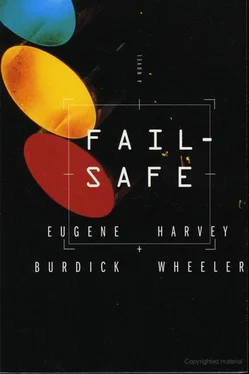He felt a moment of despair. Would he continue to awaken like this, to crash from a black terror into total wakefulness? He did not like the sudden awakenings, though as an airman, some twenty-five years before, he had gotten used to them. In those days, other sounds had brought him awake abruptly, almost like shock, with an instant heightening of the metabolic rate, a gushing of adrenalin. The whine of sirens, a rough hand shaking his shoulder on a cold English morning during World War II, the thin growing frenzy of the sound of a bomb in flight… then, oh yes, then he had come awake instantly. But it was a different kind of wakefulness, lacking in the interior terror of his Dream.
He made a decision and sat up in bed. The Dream was forgotten. He must start the long business of getting through the day. He forced himself to smile. No sweat. Getting across midtown New York this early would be a cinch. With luck he’d be able to check out a Cessna “Blue Canoe” and run down to Andrews by himself. In any case his time was O.K. The shuttle plane could get him to the Pentagon for the ten o’clock briefing. One way or another he’d make it. No sweat.
He looked over at the sleeping figure beside him. Betty had not stirred. She needed the sleep and he wanted to shave, dress, and clear out without awakening her. He eased out of bed and fumbled in a dresser drawer for clean linen.
Black was a tall man. He had a roughly hewn, square, rugged handsomeness about him. Even his head conveyed the impression of angularity and squareness, as if it had been built up out of those sharply angular plane surfaces seen in the opening examples of “How to Draw” books. He was like an unfinished piece of sculpture, sharp edges not yet rounded off. It was not simply massiveness he conveyed, it was also a sense that he would not soften with age, his flesh would not turn to fat. He had been designed by a good draftsman, rather than by a fine artist.
His head was thickly covered with deep-brown wavy hair which he kept closely trimmed. Once in prep school he had let it grow and it had turned into a tight cap of curls. A slim and fey instructor had smiled at him across the room and said, “Our forest satyr.” Black had never let his hair grow long again. His eyes were revealing and as if for protection were deep-set. They were brown eyes which fixed steadily on people. Even when he had to give a harsh reply his eyes did not waver. His perceptive subordinates could anticipate Black’s mood from the narrowing of his eyes, the slow forming of laugh lines.
Black detoured into the boys’ bedroom on his way to the bathroom. He had the old pilot’s habit: a secret, almost subconscious, trace of permanent leave-taking with each good-bye. The boys were too big now to accept a public kiss from their father, though he would have gladly bestowed it. But early in the morning he could steal in alone and softly kiss their foreheads.
John, the twelve-year-old, was tightly balled and had orbited halfway down toward the foot of the bed, his head hidden tinder the covers. Black straightened him out gently, rearranging and retucking the blankets around his shoulders and neck. David, the fourteen-year-old, was spread-eagled across his bed, half uncovered and one foot out over the edge. Black recomposed the second bed and body. The two boys were opposites in this as in so many other things. He had spent his life, it seemed, recovering David and unsuffocating John.
As he shaved, quickly and expertly with a safety razor and Aerosol lather, he regretted the time he had to spend away from the boys. Somehow, because Betty was seven years younger than he, Black felt a kind of paternalistic distance between himself and the three of them. He grinned into the mirror, That melted pretty damned fast when he was alone with Betty on what she laughingly referred to as her “responsive nights.”
He had been born into the immensely wealthy Black family of San Francisco. They had been wealthy since the Forty-finer days when a young and anonymous man named Ned Black had made a strike on the small fork of the Yuba and had returned to San Francisco with a burro carrying dose to 8,000 ounces of gold dust and nuggets. No one knew where he was born or if he had a family. The Blacks of San Francisco began with Ned Black. He had bought great sandy tracts of San Francisco and had sold them for huge profits.
Black had seen Ned Black’s library. It was made up of books by John Locke, Fourier, Robert Owens, the great Chartists, Marx, Spencer, Ricardo. The books were worn and used. Ned Black had gone off to the Civil War and came back with an empty sleeve. He was a quiet man before he left and quieter when he returned. He lectured his children on only one thing: man was social, he had a primary obligation to his society.
The Blacks, like all rich San Franciscans, gave to the Opera and the Symphony and museums, but most of their money went into schools, hospitals, and libraries. And not a single building they gave to the city bore the name of Black. Ned’s sons, grandsons, and great-grandsons all followed his quiet, intense, and private way of life. They became ministers, businessmen, educators, and a few of them, to old Ned Black’s great gratification, became politicians. Ned Black thought it the most noble of professions, the most necessary of social tasks.
Whenever there was a reform movement, a commission to investigate crime, an effort to broaden education, a Black played an important role.
Warren Black had not found it easy to follow the tradition. He had no flair for politics and little interest in business. Even when he had graduated from one of the best of the Ivy League schools he felt rootless and somehow guilty. In World War II he had joined the Army Air Force and it was there first, and later in SAC, that he found his calling. He flew and fought with unspectacular success and although he loathed the destruction of life he brought himself to agree that it was necessary. He was steady, competent, and with absolutely no desire for publicity. Over the years he had developed a love for the Air Force, although he knew that it should be impossible to love such a great impersonal organization.
Hehad met Betty when the Air Force sent him back to his Ivy League college after World War II to study international politics and foreign policy with the famous. Professor Tolliver. Betty had forced herself into one of Tolliver’s seminars and commuted from Raddiffe once a week to attend. The austere old man had balked, but Betty’s father was a famous professor of naval history and Tolliver had finally yielded. He pointed out bluntly that she was the first girl he had ever had in his foreign-policy seminar, that the talk often got “salty,” that she would not be given grace because she was a female-female was the word he used, not “girl.”
Betty nodded. When she appeared at the seminar it was more like someone coming to do battle than to discuss abstract ideas. Her face was scrubbed and without makeup. She wore severe little gray suits and she seldom smiled. She spoke with a strong even voice that was overcontrolled. It was only midway through the semester, when her anger emerged, that her face took on a striking and handsome look. It surprised Black, for he suddenly realized that she was both an attractive and a very emotional person.
Betty had been tensed against Tolliver from the start. She saw him’ as an intellectual enemy. To see Tolliver as an enemy was easy. Most of the graduate students did. To reveal antagonism was another thing. Tolliver was formidable.
Tolliver was a senior professor in the field of international relations. He came from old New England stock and his dedication to scholarship was savage, total, and complete. If his ideas led him out of the classroom and the library and into public battle he did not hesitate a moment.
Читать дальше











